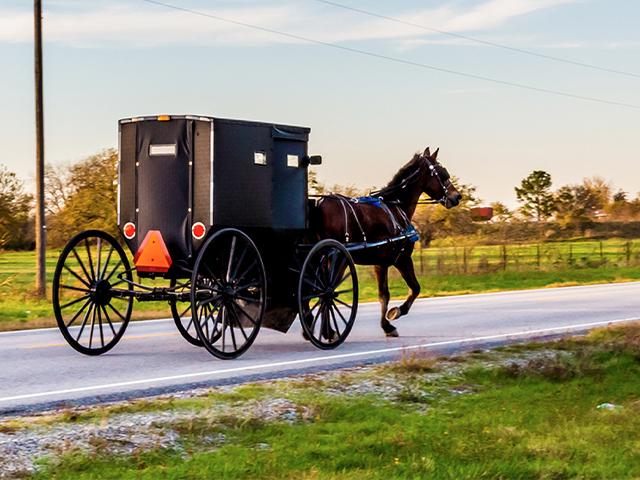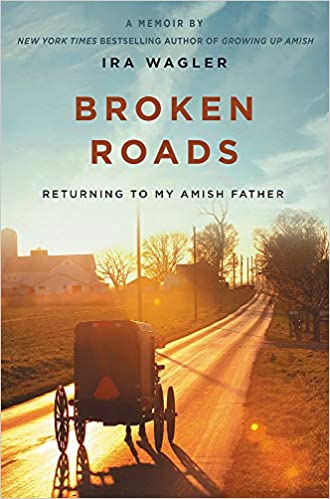NYT Bestselling Author on Reconciling with an Amish Father from a World Away

As a young man, Ira Wagler decided to leave his Amish family and community to see what the world had to offer him. Honest in his intentions, Wagler eventually found a way of life that he felt suited him better. Gone were the rigidly held beliefs and practices, replaced by a modern set of principles, ideals, and lifestyle.
But for all the new and exciting things he was experiencing in his new life, Wagler eventually came to the realization that he had fractured something that was very near and dear to him … his relationship with his devoutly Amish father.
As the follow-up to his New York Times bestseller, Growing Up Amish, Wagler has written Broken Roads: Returning to My Amish Father. In it, he illuminates the inner world of the Amish community while taking readers on his journey of forgiveness and reconciliation with his family as well as his Amish heritage.
I recently spoke with Wagler about why he chose to leave the Amish way of life, how he overcame the “shunning” of his family, and his thoughts on whether the Amish will continue to survive in the 21st Century.
First and foremost, why did you choose to break away from the Amish way of life?
I wanted to see things as a teenager. I was fairly rebellious, and I wanted to see the outside world. At 17 years old, I left in the middle of the night. That story is in my first book. It seemed to me, I was going to leave and go taste this new world. Then, I was going to come back and be a good part of the people and just be who I am among them. And it really worked out that once I stepped out there and drove a car, drove a truck, wore jeans, and had a belt instead of the suspenders. I couldn't just snap my fingers and all of a sudden be back to the old lifestyle. I tried a couple of times. But every time I was back with my people, it was so restricted that I just simply could not force myself to stay. So, eventually I broke away.
What was the greatest hardship or transition you had to make as you left your Amish world for something new and completely different?
It was kind of gradual. The first time I left I went out West to work on a ranch. It was kind of a remote isolated place, which was perfect for a young Amish kid off the farm because I was used to working.
We call people (living outside Amish communities) “English” because you're not Amish. As an English person, I could do all these things that I couldn’t do before. I guess to me, it was a freedom to choose to do what you want without all the rules. There were some hard times. Certainly, there were economic hard times and so forth, but eventually I did pursue my education and went into life. Today, I look back on that whole journey and that's where the second book comes from, the journey of what happened to me after I left.
As you broke away, you obviously must have created some fractured relationships. As I read through your book, I discovered that chief among those fractured relationships was the one you had with your father. If you could, tell me a little bit about that. What created the rift?
When I was a young child growing up, my father (David Wagler) was widely known in the Amish world. He was among the most well-known people in their culture because he was a writer. It's a little bit unusual but he took it (writing) and made it his life. His mission in life was to write. He was widely known, very famous, a great man of his culture and ethnic background. A leader in a group is often so focused on what's going on with that, that he neglects his family. And that was a little bit of what my dad did.
He was so focused on writing that we never really felt that we had much communication with him. That is where the rift began. As a young teenager I kept trying to get his attention. I ran away from home, came back, left again, came back, and left again. This second book is about simply after I had broken away, and how my life was after that. Reaching back out to him over the years, I would say I was ‘shunned’. That's a pretty brutal thing among the Amish. They shun you.
You just referenced something in Amish culture that is called shunning. What is that and how did it relate to you and your father?
In the Amish culture when a child leaves, especially if you had joined the church, the Amish community will “shun” you. I had joined the Amish church. I was engaged to a girl. I could not stay. So, I left. And when you've gone that far with them, and then you leave and go out into the English world, then you get ex-communicated. With my father, primarily what he wouldn't do is eat at the same table with me. There were a few other things that were parts of that equation as well, but when he simply will not sit down at a table and eat with you, that's very brutal.
After so many years, you felt it was important to reconcile with your father, your people and your Amish heritage. Why?
I don't know. When you’re young and hot headed you think you know everything, which I thought I did. And of course, you don't, nobody does. But as I got a little older and had traveled around, I had a chance to look back and review some of the choices I had made and the choices that the culture had made too. I recognized that there's so much good in this culture that I need to focus on that. Also, you want your father's approval. That's just a natural human yearning. We all want our father's approval. We want God's approval. So, that equation kicked in.
From the time I started college, I would not confront him. I would try to be as accessible and open as possible. I was always welcome to visit at home. They would not chase me away. I could go home. He would not eat with me, but every time there would be a lecture that I need to come back, and be Amish until the man got too old. Once you're in your eighties and approaching 90, that fire just burns out. And that's the reason that we could reconcile because the fire burned out. Because of that we could reconcile and did.
How did you eventually come to grips that your Amish heritage would always be a part of you?
It's a gradual thing. I considered it a big circle. When you break away and you're free, you think you never want to be around the Amish people. I'm done with them. I just want to leave. And then, all of a sudden, you find yourself kind of circling back. For me, it was because I eventually settled in Lancaster County, Pennsylvania, the heart of Amish country. From that point, it was just a gradual reconciliation with the culture. Then, I definitely made some serious efforts to visit my father, who was staying up in Southern Ontario, Canada which is where I was born.
So, I would go up and see him and just visit. Those things don't come fast and they don't come really easy, but it’s kind of where you need to go. You know you need to reach out. I just kept persisting quietly and not fighting anything. I tried to not make any fuss, hassle or anything. There's a scene in the book where my dad sits down and eats with me for the first time in decades. That's a fairly powerful scene in the book.
How long of a period of time was it from the time the shunning began until the two of you finally sat down and broke bread together?
It was probably a period of at least 25 years. The thing of it was, when you talk about shunning, it's not necessarily that it was this big, harsh gate that would separate us. I went there and he would visit with me. We would talk about things. It's just when the table was there, when we went to eat, I would be forced to sit at a different table. The tables were close by but separate. It's all these little legal things that go on, just so he wasn't sitting down with me. Those are just all things we had to work through. I had to work through them, and he had to work through them.
Based on the way the world has progressed, it seems like the precepts and concepts that the Amish people live by in their faith is from a different era. Will the Amish community be able to survive in its current state as we go deeper into the 21st century?
That is a really good question. You've asked a number of those. I have been saying now for the last five to ten years … I'm talking to you on an iPhone. Usually, when I'm giving a talk or a speech, I pull that iPhone out of my pocket and I show it to the crowd. I say, ‘This little device here is going to change the culture more than any single factor in the history of the Amish.’ And it will. They already have them. Not in every place, not everybody, but the culture as a whole have these iPhones. The example I give is, you are driving down the road with a horse and buggy. You’re driving the horse with one hand and you are looking at an iPhone. One day, one of those two isn’t going to make any sense and it’s not the iPhone.
There's so many good things about the Amish, not the least of which is the work ethic that the culture has held. There's faith, there's family, those are all good. Of all of those, you're taught to work from the time you can walk. You sweep the floor; you go out and feed the cows or whatever. To have that experience in my background is valuable and I appreciate that a lot.
After people have read Broken Roads, as an author, what would you like your readers to take away from the experience? What is your greatest hope for the book?
My greatest hope for the book is that people will be led to Christ of course, because that is ultimately why we're here. That book (the Bible) has so many twists and turns and things that happen. And ultimately, I see that my walk with God has been massively strengthened because of that, because of the things I went through. To reflect Christ and the Gospel is the reason we are here. That might be a little bit of a trite answer but that’s why I’m here … to spread the Gospel and to reflect Jesus. I hope people take notice of that.
To purchase Broken Roads: Returning to My Amish Father:






